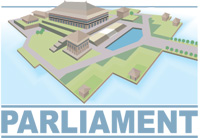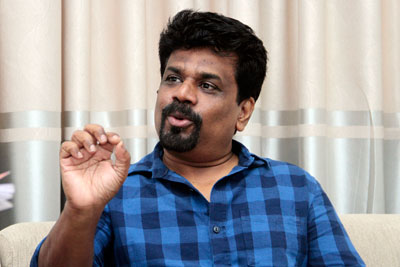Columns
House unites for Covid Bill, yet sees lockdown prescriptions and prognoses on protests
With the country being battered by COVID-19 and the daily death toll nearing 200, what was supposed to be four days of Parliament sittings was curtailed to just one day this week, mainly to pass through the Coronavirus Disease 2019 (Covid-19) (Temporary Provisions) Bill, with amendments made in keeping with the opinion of the Supreme Court.
The decision to restrict the sittings was taken on Monday at the Committee on Parliamentary Business in view of more MPs and Parliament staff testing positive for the virus.
 As a testament to just how dangerous the situation is, 275 rapid antigen tests conducted at random on MPs, Parliament staff, security personnel and journalists during a three-hour period on Tuesday at the Parliament premises resulted in 12 Parliament staff members being identified as COVID positive. That left Parliament officials scrambling to analyse CCTV footage to identify close contacts of the infected people and direct them to quarantine.
As a testament to just how dangerous the situation is, 275 rapid antigen tests conducted at random on MPs, Parliament staff, security personnel and journalists during a three-hour period on Tuesday at the Parliament premises resulted in 12 Parliament staff members being identified as COVID positive. That left Parliament officials scrambling to analyse CCTV footage to identify close contacts of the infected people and direct them to quarantine.
On Tuesday, opposition MPs renewed their calls for the Government to impose a total lockdown to avoid the collapse of the country’s overstretched health system. Some government MPs, however, continued with their accusations that it was the opposition-sponsored public protests that had resulted in the massive increase in covid patients and deaths.
Explaining the objectives behind the bill, Justice Minister Ali Sabry said it had been introduced to give relief to those who had been badly affected by the COVID-19 pandemic. The bill’s key features include provisions to designate the nearest court of concurrent jurisdiction as the alternative court due to the exigencies of the pandemic, and specifics on how court proceedings can be conducted remotely due to the COVID-19 situation.
While the main opposition Samagi Jana Balawegaya (SJB) did not object to the bill, the country’s situation raised questions whether the bill would actually bring people the relief that the government had promised, one-time health minister and SJB’s Kalutara District Parliamentarian Dr Rajitha Senaratne said. “The Justice Minister said the bill would allow cases to be transferred from one courthouse to another if a COVID situation arose in one courthouse. But given the current situation, I’m not sure if any courthouse will be spared of COVID,” Dr Senaratne said.
He pointed out that there were huge discrepancies in the number of COVID cases reported by the Government in some parts of the country and the actual number recorded by health officials of those areas. He also claimed that the statistics on COVID deaths were also being manipulated to reflect a lower number of deaths. “This is not done by the Health Ministry. We have heard from Health Ministry officials that a major general of the Army is involved in this. They go around and ask family members of those who die of COVID whether he or she had any other serious illnesses and if they did, they make it out as if the cause of death had been from other illnesses and remove them from the COVID death toll,” Dr Senaratne alleged.
He also pointed out that a large number of medical professionals and health sector unions had repeatedly warned that unless a strict lockdown was imposed even for a brief period, the country’s health system, which was already highly stretched, would be overwhelmed, with even larger numbers of people dying as a result.
Former President and Sri Lanka Podujana Peramuna (SLPP) Polonnaruwa District MP Maithripala Sirisena, who was also one time health minister, said it was regrettable that the situation had deteriorated to an extent where five to six people were dying from COVID every hour. “We should act responsibly during this crisis. I believe it is imperative that we all work together to prevent this situation from worsening.”
Mr Sirisena requested President Gotabaya Rajapaksa to call a conference of parties represented in Parliament to discuss the current crisis.
Opposition Leader Sajith Premadasa said the World Health Organisation (WHO) had warned that unless severe movement restrictions were imposed, the country’s COVID death toll could hit 30,000 by January next year.
He added that according to WHO, if such restrictions were imposed now, some 18,000 lives could be saved.
In view of such recommendations, the Government should at least impose a temporary island-wide lockdown for two weeks, the opposition leader urged.
“Are we prepared to take these actions to save people’s lives? The opposition stands ready. Is the Government ready as well?” Mr Premadasa asked.
Sounding an ominous note regarding the current spread of COVID-19, Prof. Channa Jayasumana, State Minister of Production, Supply and Regulation of Pharmaceuticals, revealed that researchers had identified three new mutations of the COVID Delta variant in the country. He said this might be one reason for the rapid spread of the virus.
The state minister said the Government’s strategy to minimise the spread of the virus was through mass vaccinations and claimed that 95 percent of those over 30 years of age had received at least one dose of a COVID vaccine while 40 percent had received both doses.
Prof. Jayasumana alleged that a wave of opposition-sponsored protests was the cause for the spread of the Delta variant. “Health authorities warned in mid July that the Delta variant had entered Sri Lanka. However, it was during this time that the opposition brought people onto the streets for countrywide protests. On July 19, I gave an interview to a newspaper warning about the possibility of the Delta variant spreading throughout the country. The day after, near the Parliament Roundabout, the SJB held a mass protest attended by hundreds. Trade unions allied to the Janatha Vimukthi Peramuna (JVP) too held such mass protests in various parts of the country, despite our appeals for them not to do so.”
The country’s COVID situation spiralled out of control mainly due to the Government’s own arrogance, National People’s Power (NPP) Gampaha District MP Vijitha Herath charged.
“You can’t find solutions to this crisis by trumpeting that you did it better than anyone else and that you vaccinated this much of the population. You should stop your arrogant boast at least now and accept the fact that you haven’t been able to control this pandemic. If you had actually controlled it, then we wouldn’t be in this situation. Today, the entire country is a funeral house. This is because you didn’t take the right decisions at the right time,” Mr Herath said, accusing the Government of failure.
Parliament will reconvene at 10 a.m. on September 6.
 Anura Kumara Dissanayake JSC meeting an affront to judicial independence, says Anura Kumara National People’s Power (NPP) Leader Anura Kumara Dissanayake raised issue in Parliament on Tuesday regarding a controversial webinar organised by the Judicial Service Commission (JSC) for judicial officers. Mr Dissanayake told the House that during the webinar on “Matters relating to Judicial Proceedings in the context of COVID-19 pandemic,” opinions had been expressed on recent rulings given by magistrates regarding requests made by police to ban public protests and remand protesters on grounds of the COVID-19 situation. “We have received information that magistrates had been put under pressure regarding their rulings. This amounts to a clear interference in the independence of the judiciary,” he charged. He pointed out that the webinar had been made mandatory for magistrates and they had been specifically warned that failure to participate would be taken into consideration when recommendations were made for “promotions, annual salary increments, foreign training and appointment to High Court.” “The magistrates had expected that the webinar was to brief them on how court proceedings could be conducted during the covid pandemic. Instead, reports indicate that what transpired was a serious threat to the country’s democracy and judicial independence,” the NPP Leader said. Mr Dissanayake asked Justice Minister Ali Sabry to explain the Government’s stance on matters that had transpired at the webinar. Justice Minister Sabry said the JSC was an independent institution. “Neither the Justice Minister nor the Government has any power to interfere in the affairs of the JSC. Therefore, this question should be directed to the JSC,” he said. | |


Leave a Reply
Post Comment